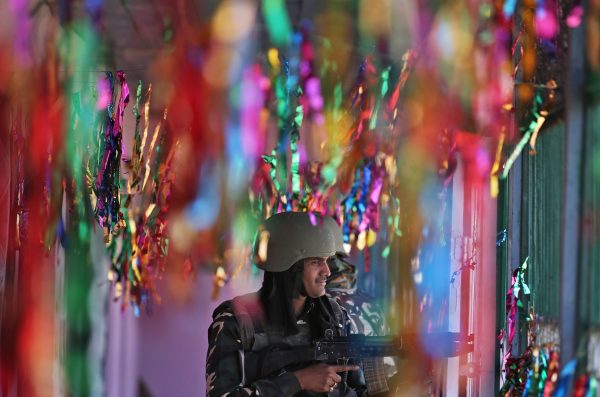Their stance on national security has been linked to a more divisive and political brand of nationalism. Narendra Modi ran in 2014 on a strong platform of inclusive economic development that suggested a future of hope for all of India. In 2019, the fear of enemies outside and inside India seem to have replaced any message of hope. The BJP’s forcefulness this election is exemplified by the Indian counterattack inside Pakistan at Balakot after the Pakistan-based Jaish-e-Mohammed (JeM)’s terrorist attack in Pulwama, Kashmir in February 2019.
Looking back at previous terrorist attacks, even in the heartland of India, their electoral aftermath shows that national security hardly figures in the minds of Indian voters.
In 2001, a high-profile attack on the Indian parliament by Lashkar-e-Taiba (LeT), JeM and their Pakistani operatives led the first BJP government under Atal Bihari Vajpayee to commandeer the biggest peacetime military mobilisation in India’s history. For Indians, the strike on their very centre of power was shocking, outraging the public and media. From December 2001 to November 2003, 500,000 Indian troops amassed at the Indian–Pakistani border for a close deadlock. The crisis was diffused with Pakistan having to publicly back down and take measures against the Pakistan-based terrorist groups.
This dramatic show of force by the BJP government drew national accolades. Yet in the general elections just a few months later, Indian voters handed the Party a completely unexpected blow by voting it out. The Congress Party, which had been all but written off, then led a victorious coalition into government. Retrospectively, most analysts blamed the BJP’s defeat on rising inflation, especially in common consumer items like onions.
In November 2008 there was a terrorist attack launched from Pakistan by LeT suicide bombers on India’s iconic Taj Hotel in the country’s financial capital of Mumbai, killing scores. The unfolding episode was caught on real-time television for emotionally draining, non-stop viewing by both Indian and global audiences.
The ruling Congress Party had an immediate two-fold response. The first response was an international diplomatic campaign aiming to isolate Pakistan for being the base of these terrorist organisations, which was largely successful. The next response was to send a clear domestic message that those responsible for the horrific attacks were India’s foremost external foes. A military response was absent. Five months later, national elections produced an almost unprecedented and unexpected result — Congress was re-elected.
The BJP’s military response did not help its elections, whereas the Congress Party’s lack of military action did not hurt its election chances. The circumstances were similar, with a high-profile terrorist attack on a major Indian city, but government responses and subsequent election results differed. The only common factor is that national security did not play a role in the electoral fortunes of either ruling party.
A more forceful reaction by the Modi government against Pakistani-based terrorism after the Pulwama attack could be viewed as justified and even overdue, given India’s past restraint. The ‘rally around the flag’ effect after the Balakot counterattack is also nothing unexpected. The use of national security to drive a wedge between domestic groups for short-term electoral gains spells danger for the country in the long term.
The government seems to be missing an opportunity to bring the country together using national security as a uniting factor, rather than a dividing one. Some affiliates of the ruling party have been going on the offensive with national security, using a fear-mongering election trope.
If there are electoral dividends from such tactics, they are likely negligible. They could come at great cost to the attractive idea of India as the world’s largest plural democracy, even as the rest of the world is looking on with a degree of awe at the unfolding of 900 million Indian voters in action.
Dr Deepa Ollapally is a Research Professor and the Director of the Rising Powers Initiative at the Elliott School of International Affairs at George Washington University.

